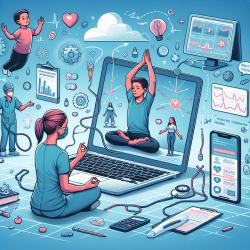In the midst of the COVID-19 pandemic, healthcare workers faced unprecedented stress levels, leading to significant impacts on their mental and physical well-being. A recent study titled "Breath-centered virtual mind-body medicine reduces COVID-related stress in women healthcare workers of the Regional Integrated Support for Education in Northern Ireland: a single group study" offers a promising solution through the Breath-Body-Mind Introductory Course (BBMIC). This blog will explore how you, as a practitioner, can implement these findings to improve your therapy outcomes and encourage further research.
The Power of Breath-Body-Mind Practices
The BBMIC study demonstrated significant reductions in perceived stress, stress overload, and physical exhaustion among participants. By integrating these practices into your therapy sessions, you can help mitigate stress and improve overall well-being for both yourself and your clients. Here are the key takeaways:
- Perceived Stress Reduction: Participants showed a significant decrease in Perceived Stress Scale (PSS) scores from baseline to 11 weeks post-intervention.
- Stress Overload Mitigation: The Stress Overload Scale-Short (SOS-S) scores for Personal Vulnerability and Event Load decreased significantly, indicating lower stress levels.
- Improved Emotional States: The Exercise Induced Feelings Inventory (EFI) showed increases in Positive Engagement, Revitalization, and Tranquility, with a decrease in Physical Exhaustion.
Practical Implementation for Therapists
Integrating BBM practices into your sessions can be straightforward and highly beneficial. Here are some steps to get started:
- Begin with Coherent Breathing: Teach clients to breathe at a pace of 5-6 cycles per minute. This practice alone can help balance the autonomic nervous system, reducing stress and enhancing calmness.
- Incorporate Movement: Combine breathing with gentle movements to further engage the body and mind. This can be particularly helpful for children with special needs or those experiencing high levels of stress.
- Regular Practice: Encourage daily practice of these techniques, both in solo and group settings. Consistency is key to achieving lasting benefits.
Encouraging Further Research
While the BBMIC study provides compelling evidence, further research is essential to validate and expand these findings. As practitioners, we can contribute to this body of knowledge by:
- Documenting Outcomes: Keep detailed records of client progress and share findings with the broader professional community.
- Collaborating with Researchers: Partner with academic institutions to conduct controlled studies that explore the long-term effects of BBM practices.
- Advocating for Training: Encourage institutions to incorporate BBM training for healthcare workers and educators, promoting a culture of well-being and resilience.
To read the original research paper, please follow this link: Breath-centered virtual mind-body medicine reduces COVID-related stress in women healthcare workers of the Regional Integrated Support for Education in Northern Ireland: a single group study.










